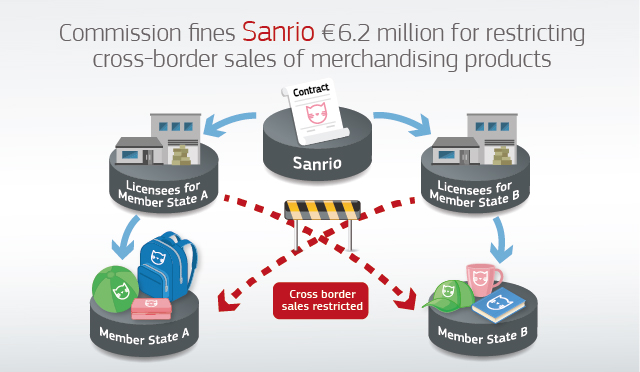
The European Commission has fined Sanrio €6.2 million for banning traders from selling licensed merchandise to other countries within the EEA. This restriction concerned products featuring Hello Kitty or other characters owned by Sanrio.
Licensed merchandising products are extremely varied (e.g. mugs, bags, bedsheets, stationery, toys) but all carry one or more logos or images protected by intellectual property rights (IPRs), such as trademarks or copyright. Through a licensing agreement, one party (a licensor) allows another party (a licensee) to use one or more of its IPRs in a certain product. Licensors typically grant non-exclusive licenses to increase the number of merchandising products in the market and their territorial coverage.
Sanrio Company, Ltd. is a Japanese company that designs, licenses, produces and sells products featuring Hello Kitty, an anthropomorphic cat girl also known by her full name Kitty White, and other popular characters such as My Melody, Little Twin Stars, Keroppi or Chococat. Through its subsidiary Mister Men Limited, Sanrio also holds the intellectual property rights to the “Mr. Men” and “Little Miss” series of animated characters.
In June 2017, the Commission opened an antitrust investigation into certain licensing and distribution practices of Sanrio to assess whether it illegally restricted traders from selling licensed merchandise cross-border and online within the EU Single Market. The Commission investigation has found that Sanrio’s non-exclusive licensing agreements breached EU competition rules:
- Sanrio imposed a number of direct measures restricting out-of-territory sales by licensees, such as clauses explicitly prohibiting these sales, obligations to refer orders for out-of-territory sales to Sanrio and limitations to the languages used on the merchandising products.
- Sanrio also implemented a series of measures as an indirect way to encourage compliance with the out-of-territory restrictions. These measures included carrying out audits and the non-renewal of contracts if licensees did not respect the out-of-territory restrictions.
The Commission has concluded that Sanrio’s illegal practices, which were in force for approximately 11 years (from 1 January 2008 until 21 December 2018), partitioned the Single Market and prevented licensees in Europe from selling products cross-border, to the ultimate detriment of European consumers.
Sanrio’s licensing agreements for merchandising products infringed Article 101 of the Treaty on the Functioning of the European Union (TFEU), which prohibits agreements between companies that prevent, restrict or distort competition within the EU’s Single Market.
Sanrio cooperated with the Commission beyond its legal obligation to do so, in particular by providing the Commission with information that allowed it to establish the extended duration of the infringement. The company also provided evidence with significant added value and expressly acknowledged the facts and the infringements of EU competition rules.
Therefore, the Commission granted Sanrio a 40% fine reduction in return for this cooperation. Further information on this type of cooperation can be found on the Competition website.